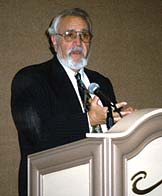
Abdulaziz, a partner in the law offices of Abdulaziz & Grossbart, North Hollywood, Calif., began his seminar by noting how a quick visual glance at a contract can tell the subcontractor a lot.
"When you get a subcontract agreement, you can look down in the lower left-hand corner and tell who the form favors," he said. "For example, the name of a group or association on the form is a dead giveaway.
"If the form shows ‘AGC,' the contract benefits prime contractors. If it shows ‘ASA,' it benefits subcontractors."
He said there is an "AIA" contract, which is designed to protect architects, but it affords equal protection between prime contractors and subcontractors. "The AIA contract is used everywhere if primes or subs don't want to spend money to have attorneys look the contract over," Abdulaziz stated.
He said there are also a number of "bastard" contracts that contain a number of different clauses not found in the standard contracts. Abdulaziz recommends reading all clauses very carefully.
"If you knowingly took the risk of a bad clause, you have nothing to fall back on," he said. "Who bears the risk of something that goes wrong? This is not morality; this is a business.
"Construction disputes are very expensive to litigate. We have created a cottage industry for mediators who beat people over the head to settle a dispute."
Killer Clauses
Here are some examples of clauses to watch out for:Pay if paid - This is simply an "if I don't get paid, you don't get paid" clause, which Abdulaziz said is unconstitutional in California. "Most states have said that there is no valid ‘pay if paid' clause," he stated.
No abandonment/continue to work - There is no good way to modify this clause. Abdulaziz said, "It is very scary to walk off a job. Continue to work and have an arbitrator review the differences [between the parties]."
Termination for convenience - The prime can terminate a contract for any reason. "Although there is some question whether this is enforceable, courts have enforced the clause," he said. "Try and limit this to times when the owner has terminated the prime for convenience."
Termination for cause - If the work is done correctly, the sub can still be terminated. "Try to expand the ‘cure' period as much as possible," Abdulaziz said.
Scope of work - Abdulaziz suggested trying to limit this clause to things that you have reviewed. "What is it that you are going to do?" he asked. "Are you taking on responsibilities as the prime does for the owner?"
He stated that subs should specify inclusions and exclusions very carefully.
Indemnity - "Try and limit your liability based upon a percentage of your own active or passive negligence," Abdulaziz said. "If you cannot do so, try and limit your liability to personal injury. Personal injury is usually covered by liability insurance.
"The indemnity clause will give you a flavor for the rest of the contract. If it is tough, the other clauses will be tough."
Hints For Subcontractors
Abdulaziz said it is vitally important to document everything with photos, notes, letters, etc. He also said it is important to bill frequently. "It tells the owners or the primes what you have been doing and helps cash flow," he said. "I expect that the prime will have these kind of clauses in their contracts. If they pay you based on what you have done, it is hard for them to come back asking to explain what you have done when they have paid you for something that isn't complete."He said that when submitting a bid, use verbiage similar to "This bid is based on a contract which will include terms and conditions similar to the AIA form ________ or ASA form _______."
Abdulaziz said there are specific clauses to consider, too. He said there should be a schedule clause specifying a time for starting, acceleration/delay, substantial completion, etc.
"Keep in mind that if the project has a far out [future] completion date, you may not be able to fulfill your part of the schedule," he said. "You may not have enough manpower 60 days from the start, for example."
Abdulaziz did mention an asbestos/mold clause - a topic of great importance to HVACR contractors. "You could put a clause in the contract that you cannot get mold insurance coverage," he said. "This may prevent people from suing you because they can't bring an insurance company to the table to get the money from them."
For more information, visit www.aglaw.net or e-mail Abdulaziz at info@aglaw.net.
Publication date: 12/08/2003
